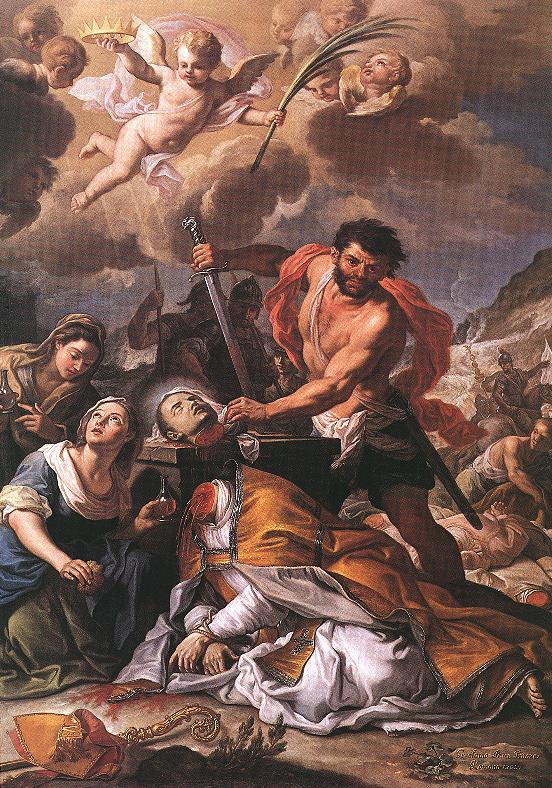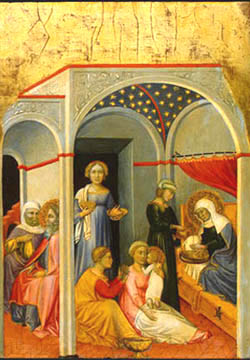Sept. 19: St. Januarius, Bishop & Martyr, and His Companions, Martyrs (Gueranger)

September 19
SAINT JANUARIUS BISHOP AND MARTYR AND HIS COMPANIONS MARTYRS
Januarius is ever preaching the Gospel to every creature; for his miraculous blood perpetuates the testimony he bore to Christ. Let those who say who say they cannot believe unless they see, go to Naples; there they will behold the martyr's blood, when placed near his head which cut off sixteen hundred years ago, to liquefy and boil as at the moment it escaped from his sacred veins. No; miracles are not lacking in the Church at the present day. True, God cannot subject Himself to the fanciful requirements of those proud men, who would dictate to Him the conditions of the prodigies they must needs witness ere they will bow before His infinite Majesty. Nevertheless, His intervention in interrupting the laws of nature framed by Him and by Him alone to be suspended, has never yet failed the man of good faith in any period of history. At present there is less dearth than ever of such manifestations.
The following is the legend concerning St. Januarius and the sharers in his glorious martyrdom.
During the persecution of the Christians under Diocletian and Maximian, Januarius, bishop of Beneventum, was brought before Timothy, president of Campania, at Nola, for the profession of the Christian faith. There, his constancy was tried in various ways. He was cast into a burning furnace, but escaped unhurt, not even his garments or a hair of his head being injured by the flames. This enraged the president, who commanded the martyr's body to be so stretched that all his joints and nerves were displaced. Meanwhile, Festus his deacon, and Desiderius a lector, were seized, loaded with chains, and dragged, together with the bishop, before the president's chariot to Pozzuolo. There, they were cast into a dungeon, where they found the deacons Sosius of Misenum and Proculus of Pozzuolo, with Eutyches and Acutius, laymen all condemned to be thrown to wild beasts.
The following day, they were all exposed in the ampitheatre; but the beasts, forgetting their natural ferocity, crouched at the feet of Januarius. Timothy, attributing this to magical arts, condemned the martyrs of Christ to be beheaded; but as he was pronouncing the sentence, he was suddenly struck blind. However, at the prayer of Januarius, he soon recovered his sight; on acocunt of which miracle, about five thousand men embraced the faith. The ungrateful judge was in no way softened by the benefit conferred upon him; on the contrary, he was enraged by so many conversions; and, fearing the emperor's edicts, he ordered the holy bishop and his companions to be beheaded.
Eager to secure, each for itself, a patron before God among these holy martyrs, the neighbouring towns provided burial places for their bodies. In obedience to a warning from heaven, the Neapolitans took the body of Januarius, and placed it first at Beneventum, then in the monastery of Monte Vergine, and finally in the principal church at Naples, where it became illustrious for many miracles. One of the most remarkable of these was the extinction of a fiery eruption of Mount Vesuvius, when the terrible flames threatened with destruction not only the neighbourhood but even distant parts. Another remarkable miracle is seen even to the present day, namely: when the martyr's blood, which preserved congealed in a glass vial, is brought in presence of his head, it liquifies and boils up in a wonderful manner, as if it had been but recently shed.
O holy martyrs, and thou especially, O Januarius, the leader no less by thy courage than by thy pontifical dignity, your present glory increases our longing for heaven; your past combats animate us to fight the good fight; your continual miracles confirm us in the faith. Praise and gratitude are therefore due to you on this day of your triumph; and we pay this our debt in the joy of our hearts. In return, extend to us the protection, of which the fortunate cities placed under your powerful patronage are so justly proud. Defend those faithful towns against the assaults of the evil one. In compensation for the falling away of society at large, offer to Christ our King the growing faith of all who pay you honour.



